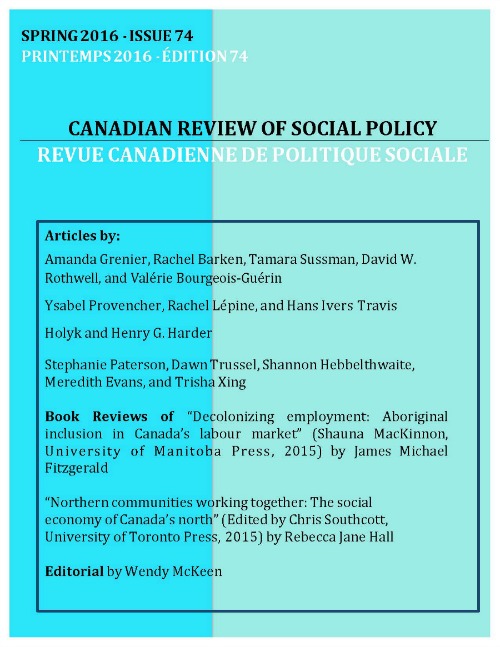Aboriginal child welfare in British Columbia and unequal power relations: A critical discourse analysis
Keywords:
First Nations, Aboriginal, discourse, child welfare policy, powerAbstract
This is a paper about unequal power relations in Aboriginal child welfare in British Columbia. We analyze a number of rhetorical devices used by the Representative for Children and Youth in her report When Talk Trumped Service: A Decade of Lost Opportunity for Aboriginal Children and Youth in B.C. We include language, financial numbers, charts and graphs that reinforce domination of Aboriginal peoples and potentially undermine the efforts of Aboriginal people’s toward self-determination in child welfare. The paper provides examples of how power manifests itself through language, reinforcing historically negative stereotypes that are then supported in the media. We conclude that such reports reflect a colonial legacy that continues to inform relations between Aboriginal and non-Aboriginal peoples, and if not critically assessed will significantly impact Aboriginal Child Welfare policy, funding and practice decisions.
La protection des enfants autochtones en Colombie-Britannique et les rapports de force inégaux : une analyse du discours critique.
Résumé
Cet article examine les rapports de force inégaux qui sont manifestés à travers la politique de la protection des enfants autochtones, en Colombie-Britannique. Nous faisons analyse de nombres de divers procédés de rhétorique utilisés par la représentante des enfants et des adolescents de la Colombie-Britannique dans son rapport, WhenTalk Trumped Service: A Decade of Lost Opportunity for Aboriginal Children and Youth in B.C. Nous incluons dans cette analyse le langage, les données financières, les tableaux et les graphiques, qui renforcent la domination des peuples autochtones, et qui, potentiellement, sapent les efforts des peuples autochtones à s’autodéterminer en matière de protection de l’enfance. Cet article fournit des exemples des manifestations du pouvoir à travers le langage, réifiant des stéréotypes négatives historiquement associés aux autochtones, et qui se retrouvent répétés de nouveau et promus à travers les médias. Nous concluons que des rapports tel celui-ci reflète un héritage colonial qui continue d’influencer les relations entre autochtones et non-autochtones. S’ils ne sont pas évalués de manière critique, ceux-ci continueront d’influencer négativement les politiques, les practices et les décisions des politiques de protection de l’enfance autochtone.
Mots Clefs : Premières Nations; autochtones; discours; politique de protection à l’enfance; pouvoir
Downloads
Published
How to Cite
Issue
Section
License
1-The author guarantees that the manuscript is an original work not published elsewhere in print or electronically in whole or in part, except in abstract form, that the author has the full power to make this contribution, and that the manuscript contains no matter libelous or otherwise unlawful or which invades the right of privacy or which infringes any proprietary right.
2-The author guarantees that the manuscript has not been previously published in print or electronically and that if the manuscript contains any tables, figures or images fully reproduced or closely adapted from previously published material, the author must obtain the necessary permission from the author/publisher holding the original copyright prior to publication in CRSP. The author may be required to produce evidence of permission granted to CRSP’s editors.
3-As a condition of publication in CRSP, the author assigns all copyright to CRSP, including but not limited to the right to publish, republish, and otherwise distribute this manuscript in print, electronic, or other formats. As CRSP is a non-profit interdisciplinary scholarly journal, the author will receive no royalty or other monetary compensation for the assignment set forth in this agreement.
For the purpose of full disclosure, CRSP will not normally use the content provided by the author in a commercial venture, but for the purpose of disseminating the author’s content to as many readers as possible. For distribution, third parties engaging in commercial activities may be contracted to distribute the content globally, and such parties may make a profit out of the author’s content in their normal course of business. CRSP will not pay the author or reimburse the author in any form based on such commercial activities because the conduct of such commercial activities is outside the control of CRSP.
Any future reference to or use of this published material by the authors must acknowledge CRSP as the original place of publication.
PERMISSION REQUEST/ARCHIVING
Permission is given to author(s) receiving funding via Tri-Council Agencies, the Canadian Institutes of Health Research (CIHR), the Natural Sciences and Engineering Research Council of Canada (NSERC) and the Social Sciences and Humanities Research Council (SSHRC), to make their publications freely available in an Open Access repository within the stated deadline by the Tri-Council Agencies (12 months following publication). Archiving of publication must be a manuscript copy bearing none of the CRSP headers, footers or any other distinguishing marks. No links to the article on the CRSP website is permitted.
Permission requests from third parties to reproduce articles in part or full in academic/educational publications can be directed to the managing editor of CRSP, and will not be unreasonably denied.

